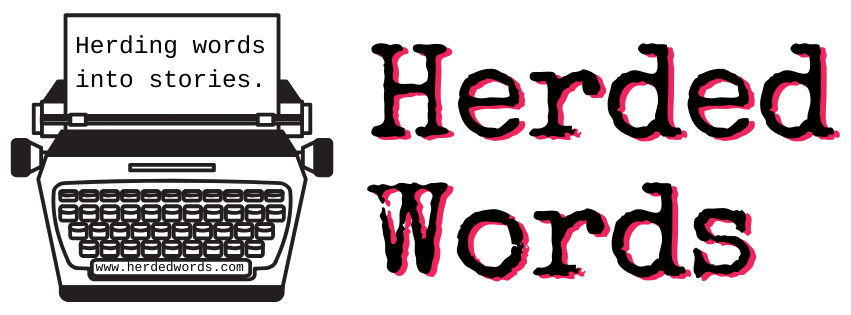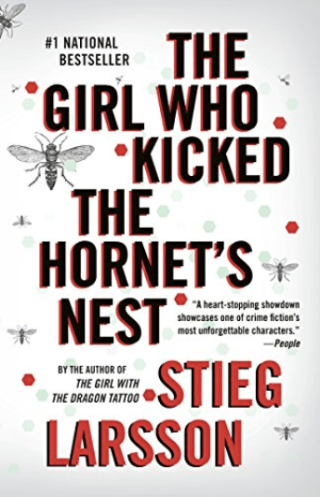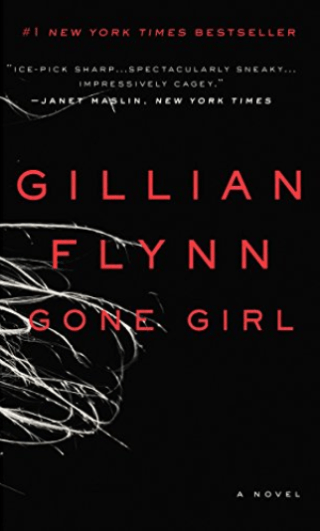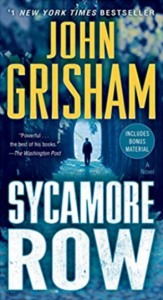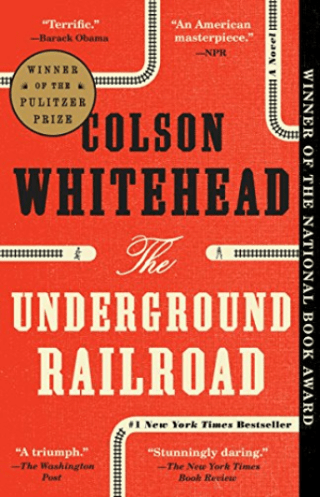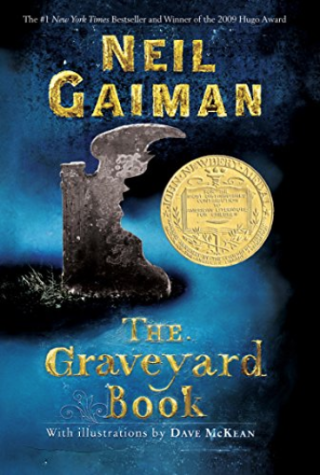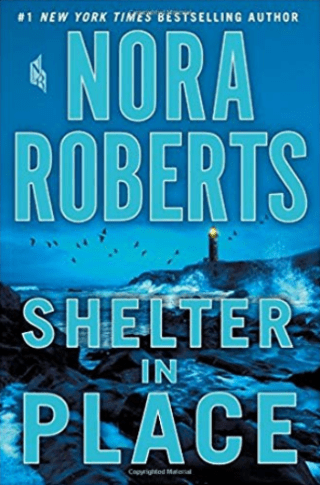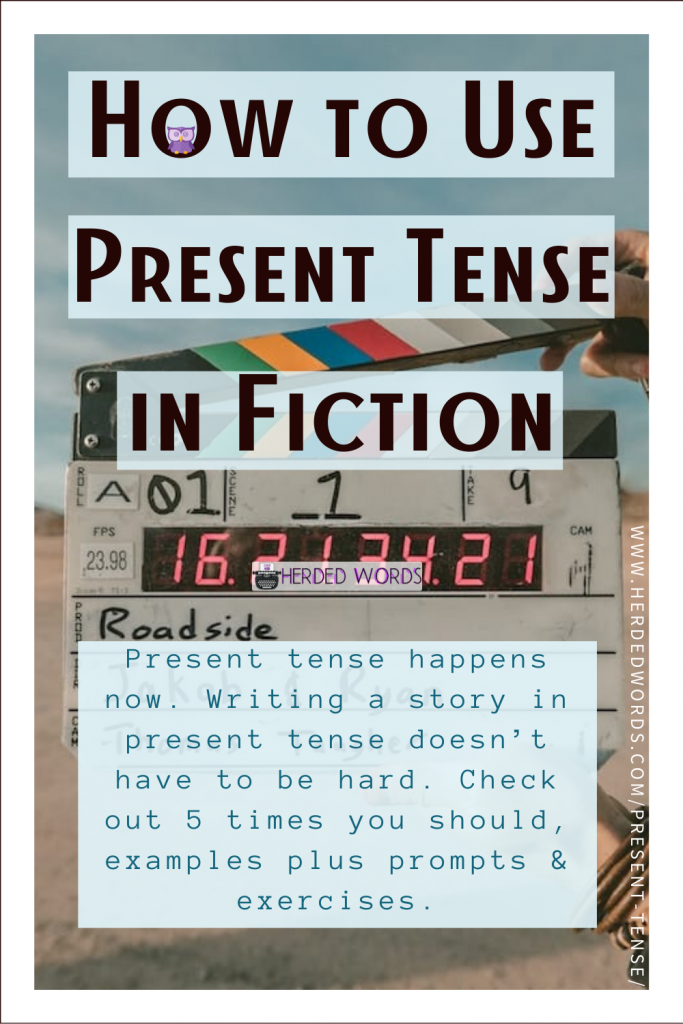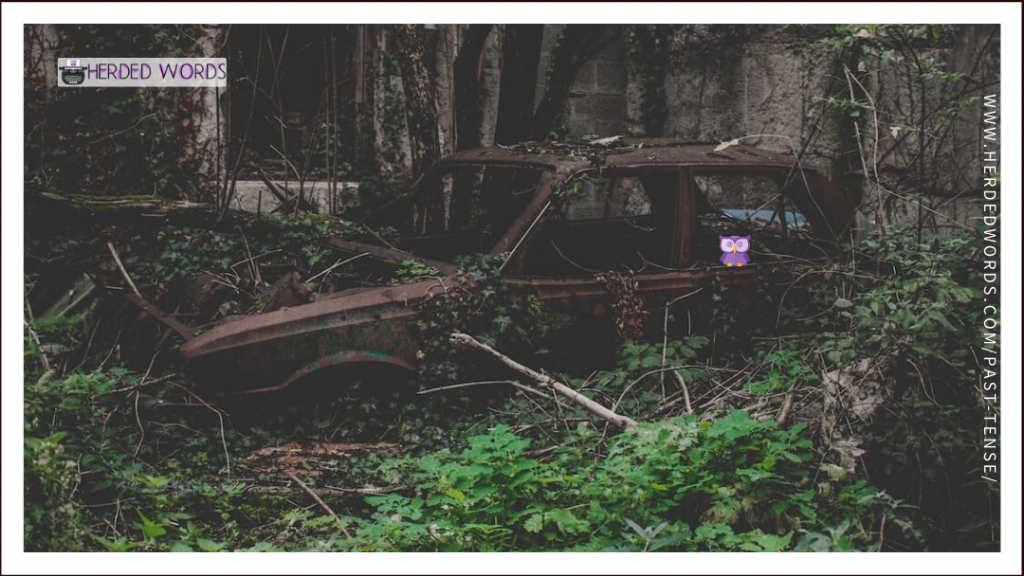
Herdedwords.com uses affiliate links. This means we receive a commission on the sale of certain items. This is at NO additional cost to you. Visit the policies page to learn more.
Over. Finished. Completed. Done. Past tense is the most common tense used in genre fiction.
Present tense, while rising in popularity, is still a minority. One of the first decisions to make about a story is what tense you will use – past or present?
Even if you’re 100% certain your novel will be in the present tense, you should understand how the past tense works and why it’s so common.
Let’s dive right into the Past Tense.
Table of Contents
Verb Tense Definitions & Explanations
Verbs! Verbs! Verbs! What is a verb?
Verbs are used to describe actions, occurrences or states of being. There are 3 tenses – Past, Present & Future.
| PAST tense | PRESENT tense | FUTURE tense | |
| ACTION | He SMILED at her. | He SMILES at her. | He WILL SMILE at her. |
| OCCURENCE | They BECAME doctors. | They ARE BECOMING doctors. | They WILL BECOME doctors. |
| STATE OF BEING | She WAS excited. | She IS excited. | She WILL BE excited. |
The 4 Past Tenses
Grammar is a tricky beast and the past tense is no exception. There are four ways we use the past tense – simple, progressive, perfect & perfect progressive.
| Explain, Please. | Example | |
| SIMPLE *This is what you’ll find in most stories* | The simple past tense describes something that was started and completed entirely in the past. | John wanted to be a writer. |
| PROGRESSIVE | The past progressive tense describes something that was started and continues in the past. | He was always writing in his journal. |
| PERFECT | The past perfect tense describes something that was completed before something else. | John had begun to write his first novel in November. |
| PERFECT PROGRESSIVE | The past perfect progressive tense describes something that was started and continued to a specific point in the past. | He had been writing his novel for 2 months before he finished. |
The four ways we use past tense – simple, progressive, perfect & perfect progressive – are also used when we write in present tense.
Write a Story in Past Tense to…
#1 – shift time, a lot.
Past tense allows for the most flexibility in time. You can go forward, backward, stay in the now. Whenever you want to write about, you can.
Example: THE GIRL WHO KICKED THE HORNETS’ NEST
THE GIRL WHO KICKED THE HORNETS’ NEST, published in 2010 is a mystery, thriller & suspense novel by Stieg Larsson. It’s book 3 in the Millennium series.
THE GIRL WHO KICKED THE HORNETS’ NEST spent 9 weeks at #1 on the NYT Bestseller List. The Swedish version of the movie was released in 2009. The US version of the movie is not yet complete.
THE GIRL WHO KICKED THE HORNETS’ NEST covers about a 9 month period of time. To help make the timeline clear, chapter titles are dates.
Friday, April 8
Example: THE THREE-BODY PROBLEM
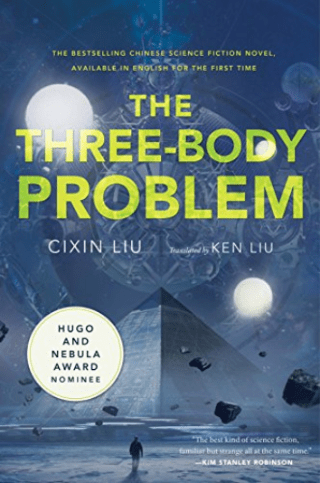
THE THREE-BODY PROBLEM, originally published in China in 2008, is a Science Fiction novel by Cixin Liu.
It was translated into English by Ken Liu and published in 2014.
It won the 2018 Hugo Award. THE THREE-BODY PROBLEM is book 1 in the Remembrance of Earth’s Past trilogy.
THE THREE-BODY PROBLEM covers a long period of time. Chapters regularly start with a sentence telling the reader how much time has passed since the end of the last chapter. When we learn about the past, it feels natural to the story.
Eighty-five thousand Trisolaran hours (about 8.6 Earth years) later
#2 – Have a Larger Range of Narration
What is narration?
Vocabulary.com defines narration as,
the act of telling a story, usually in some kind of chronological order. Making up a scary ghost story and relating it around a camp fire is an act of narration. Narration generally means any kind of explaining or telling of something.
Past tense makes a larger range of narration more accessible. Using past tense you can have more narrative options. For example, speaking straight to the reader, entering characters thoughts, moving through time, and more.
Example: GONE GIRL
GONE GIRL, published in 2012, is a mystery, thriller & suspense novel by Gillian Flynn. The movie was released in 2014.
GONE GIRL spent 8 weeks at #1 on the NYT Bestseller List. It’s estimated the novel sold more than 15 million copies worldwide by 2016.
GONE GIRL uses a large variety of narration throughout the novel. The novel is written in both past and present tense. It’s written in first-person point of view but from three different perspectives – Nick Dunne, Amy Elliott’s diary and Amy Elliott Dunne.
I did not yet understand how foolish, how optimistic, how, yes, just like Nick I was for thinking this. The misery it would lead to.
#3 – Provide a Comfortable Reading Experience
Past tense is the most commonly used tense in stories. Written and oral stories are usually told in the past tense. This can make a reader more comfortable jumping in to read the story.
Example: SYCAMORE ROW
SYCAMORE ROW, published in 2013, is a mystery, thriller & suspense novel by John Grisham.
SYCAMORE ROW spent 7 weeks at #1 on the NYT Bestseller List. Between 2009 and 2018, John Grisham spent a total of 40 weeks at #1 on the NYT Bestseller list.
SYCAMORE ROW is an excellent example of a comfortable reading experience. It was a bestseller, written by an author with numerous bestsellers. People buy books by John Grisham because they know what to expect of the experience. If readers found his novels uncomfortable, they wouldn’t purchase them in such a large volume.
He was at the end of a rope, six feet off the ground and twisting slightly in the wind.
Example: THE UNDERGROUND RAILROAD
THE UNDERGROUND RAILROAD, published in 2016, is a historical fiction novel by Colson Whitehead. Amazon Studios is planning a limited drama series based on the novel.
THE UNDERGROUND RAILROAD won the 2017 Pulitzer Prize for Fiction and the 2016 National Book Award for Fiction.
Authors often choose the past tense when writing about an uncomfortable topic. If readers are going to be uncomfortable with the subject matter, it’s easier to handle if they’re comfortable with the novels tense. THE UNDERGROUND RAILROAD is no exception. It’s a story of fleeing slavery. If it had been written in the present tense, many readers may have been too uncomfortable to read it.
Then the cane was out of her hand. It came down on her head. It crashed down again and this time the silver teeth ripped across her eyes and her blood splattered the dirt.
#4 – Have More Dramatic Irony
What is dramatic irony?
According to dictionary.com, dramatic irony is
irony that is inherent in speeches or a situation of a drama and is understood by the audience but not grasped by the characters in the play.
Past tense has a greater availability to use dramatic irony because it has a greater range of narration.
The fact that the story is being told in the past tense, means that it’s completed. This enables a writer to use the maximum amount of dramatic irony in their story.
Example: THE GRAVEYARD BOOK
THE GRAVEYARD BOOK, published in 2008, is a children’s fantasy novel by Neil Gaiman.
THE GRAVEYARD BOOK won the 2009 Hugo Award. Disney is planning a movie based on the novel.
THE GRAVEYARD BOOK starts with dramatic irony. The reader is there at the beginning and learns more about Bod than he knows about himself.
“Why amn’t I allowed out of the graveyard?” he would ask,
#5 – Have an Easier Tense to Manage
Past tense is much more flexible than present tense which makes it easier to use. It’s also the tense we tell stories in naturally. Present tense is extremely difficult to write well.
Example: SHELTER IN PLACE
SHELTER IN PLACE, published in 2018, is a romance novel by Nora Roberts.
SHELTER IN PLACE spent 1 week at #1 on the NYT Bestseller List. Between 2009 and 2018, Nora Roberts spent a total of 29 weeks at #1 on the NYT Bestseller list (16 weeks as Nora Roberts + 13 weeks as JD Robb).
SHELTER IN PLACE is a fast-paced easy to digest novel written by the prolific writer, Nora Roberts. Her books would not be the same if she were to write them in the present tense. The flexibility of the past tense allows Roberts to move her stories along quickly.
She knew his name, even knew why she’d decided to have sex with him. He looked clean, in good shape, and had wanted just what she had.

Writing Practice
Fairytales are already written in the past tense. Today, we’ll be extending scenes from LITTLE RED RIDING HOOD to practice writing in the past tense.
We’ll be using the version LITTLE RED-CAP written by the Brothers Grimm. If you’re not familiar with the story, take 5 minutes and give it a read.
Exercise: Extend a Passage
The excerpt below is 34 words.
Your Task: Increase the excerpt to be a minimum of 70 words. Be creative!
LITTLE RED-CAP Excerpt
The wolf thought to himself: ‘What a tender young creature! what a nice plump mouthful—she will be better to eat than the old woman. I must act craftily, so as to catch both.’
Need an idea?
This is your drill. You can do anything you want to this excerpt, as long as it’s in the past tense! However, if you’re drawing a complete blank…
Describe how/why the wolf sees Red as a ‘tender young creature,’ instead of just having him think it.
- What makes Red attractive to the wolf?
- Is it because she’s young?
- Does she have a delicious scent?
- Perhaps she reminds him of a child he devoured in the past.
- Does the wolf need both Red & the Grandmother because it’s been a long time since he last ate?
- Or is he just greedy?
The wolf watched Red with great interest. ______________________. He thought to himself: ‘What a tender young creature! what a nice plump mouthful—she will be better to eat than the old woman. I must act craftily, so as to catch both.’
Exercise: Extend the Passage
The excerpt below is 43 words.
Your Task: Add creative details to make the passage below at least 200 words.
Challenge Bonus: Try not to write any dialogue.
LITTLE RED-CAP Excerpt
The wolf lifted the latch, the door sprang open, and without saying a word he went straight to the grandmother’s bed, and devoured her. Then he put on her clothes, dressed himself in her cap laid himself in bed and drew the curtains.
Need an idea?
Again, the only rule to the changes is that they stay in the past tense. Be creative! Write something absolutely absurd. If absolutely nothing comes to you, try this…
Leave everything except the 3 words “and devoured her.” Extend that. Turn three words into 150+!
Write a whole scene of the wolf devouring the grandmother:
- Does the grandmother struggle?
- Do things break?
- Is the scene gruesome and bloody or is the wolf quiet and cunning?
The wolf lifted the latch, the door sprang open, and without saying a word he went straight to the grandmother’s bed and devoured her. _______________________. Then he put on her clothes, dressed himself in her cap laid himself in bed and drew the curtains.
It’s Already Done
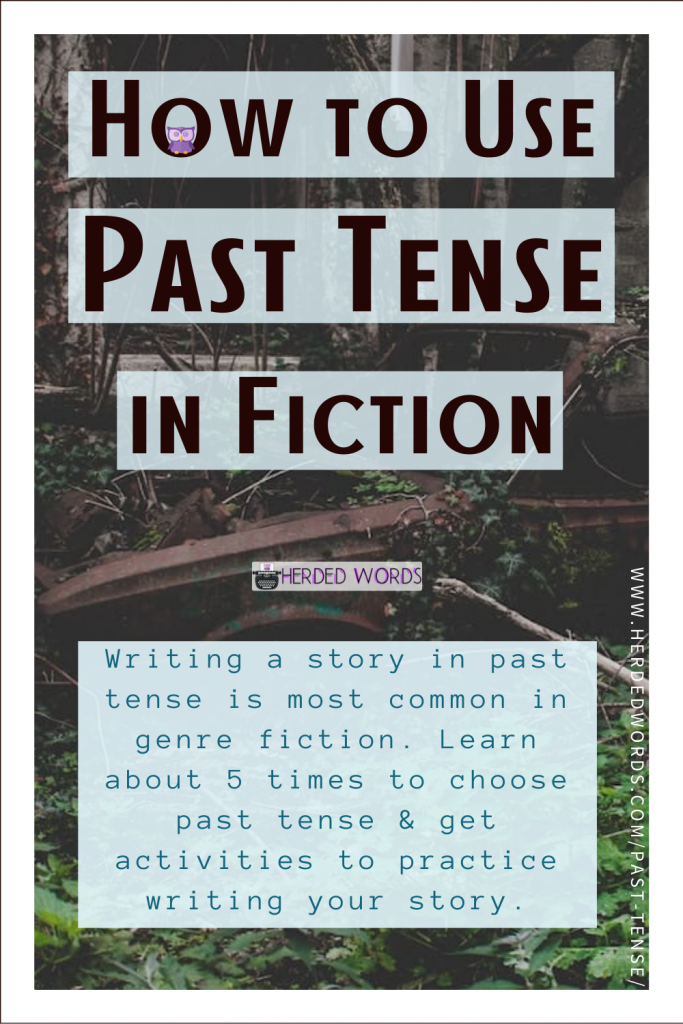
It’s amazing how the same 50 words or less can inspire so many different ideas.
Now that you’re comfortable with the past tense, you should become familiar with the present tense. Check out How to Write a Story in Present Tense next.
Like this post? Please PIN IT and follow me on social media. Thanks!
